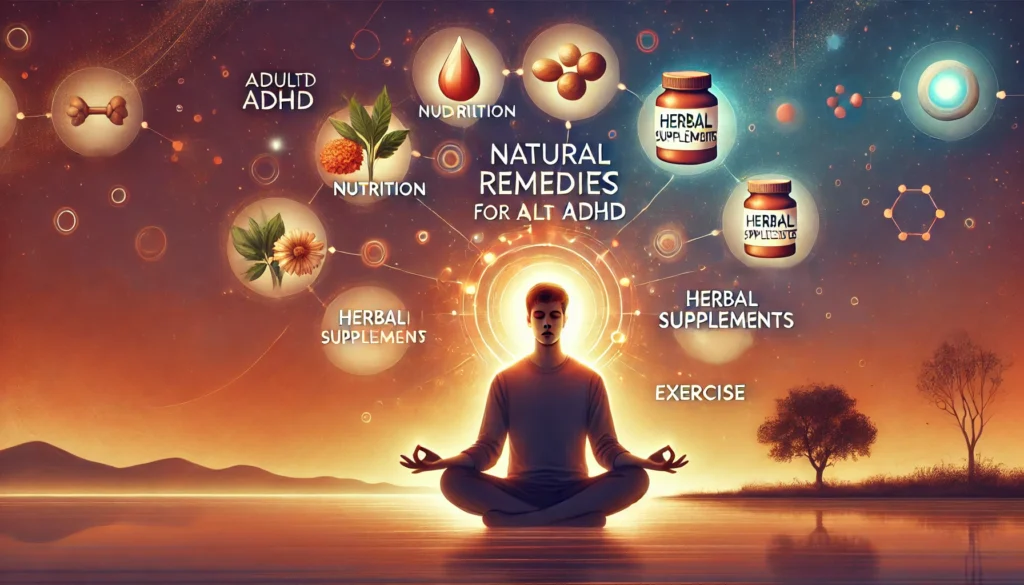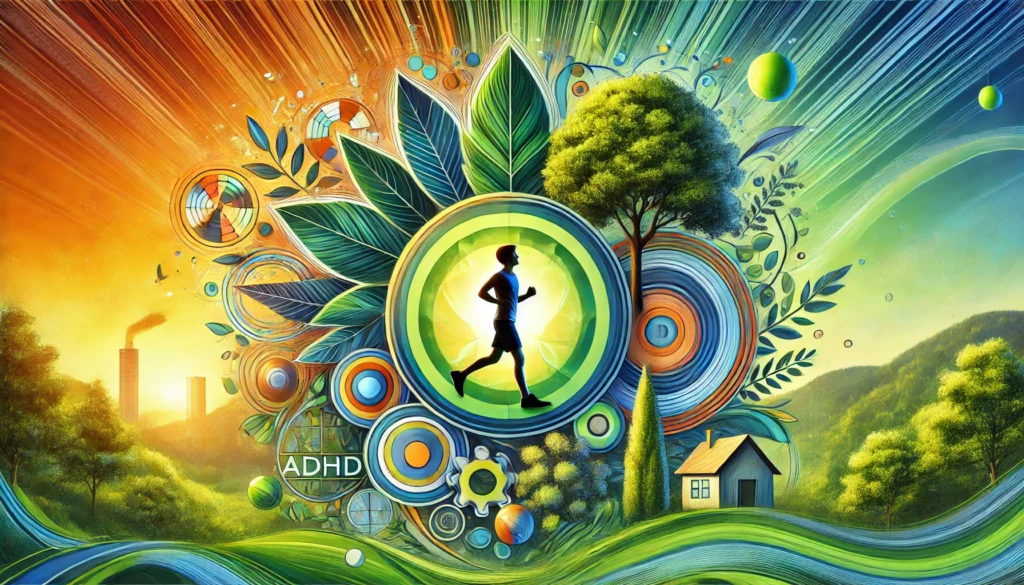Attention Deficit Hyperactivity Disorder (ADHD) isn’t just a childhood concern. Many adults continue to experience symptoms that impact their daily lives, from focus struggles to impulsivity. While medication is often the go-to solution, there’s a growing interest in natural treatments for attention deficit disorder in adults. Nutrition plays a pivotal role in managing ADHD symptoms, offering hope through natural remedies and lifestyle adjustments.
You may also like: Enhancing Concentration: Strategies for ADHD
Understanding ADHD in Adults
ADHD is a neurodevelopmental disorder characterized by persistent patterns of inattention, hyperactivity, and impulsivity. While it’s commonly associated with children, about 4% of adults experience ADHD, with symptoms sometimes evolving or intensifying over time. The journey to understanding ADHD includes not only recognizing the symptoms but also exploring diverse treatment approaches, including natural remedies for adult ADHD.
Symptom Evolution Over Time
In adults, ADHD symptoms can manifest differently compared to childhood. Adults might experience less overt hyperactivity but more internal restlessness or difficulties with time management and organization. Understanding this evolution is crucial for recognizing and addressing symptoms early.
Diagnostic Challenges
Diagnosing ADHD in adults can be complex, as symptoms often overlap with other mental health disorders such as anxiety and depression. Comprehensive evaluations by mental health professionals are essential for accurate diagnosis, ensuring that individuals receive appropriate treatment.
The Role of Environment and Lifestyle
Environmental factors and lifestyle choices can significantly influence ADHD symptoms in adults. Stress, poor diet, and lack of sleep can exacerbate symptoms, making it essential to consider these elements when developing a treatment plan. Lifestyle modifications can be a powerful component of a holistic approach to managing ADHD.
The Limitations of Conventional Treatment
Pharmaceutical treatments, while effective for many, can come with undesirable side effects such as insomnia, decreased appetite, and mood swings. These challenges have led to an increased interest in natural ADD medication for adults, focusing on holistic approaches to symptom management.
Side Effects and Patient Concerns
Medications can provide symptom relief but often come with a host of side effects that can affect quality of life. Insomnia, decreased appetite, and mood swings are common complaints that lead patients to seek alternative treatments. Understanding these concerns is essential for healthcare providers.
Long-term Dependency Issues
There’s a growing concern about the long-term dependency on ADHD medications. Many adults are seeking ways to reduce or eliminate their reliance on pharmaceuticals, exploring natural treatments that can provide sustainable symptom management without the risk of dependency.
The Shift Towards Integrative Medicine
As awareness of the limitations of conventional treatments grows, there’s a noticeable shift towards integrative medicine. This approach combines traditional medical treatments with complementary therapies, such as nutritional adjustments and mindfulness practices, offering a more comprehensive strategy for managing ADHD.
The Nutritional Connection
Nutrition’s influence on brain health is profound, and its role in managing ADHD symptoms is gaining significant attention. Certain dietary modifications can serve as natural cures for ADHD, offering a sustainable way to enhance concentration, reduce hyperactivity, and improve overall cognitive function.
Macronutrients and Their Impact
- Proteins: Proteins are essential for neurotransmitter production, which plays a critical role in mood regulation and cognitive function. Incorporating high-protein foods such as lean meats, eggs, and legumes can be part of a natural treatment for ADHD.
- Role in Neurotransmitter Synthesis: Proteins are building blocks for neurotransmitters like dopamine and serotonin, crucial for mood and focus. Ensuring adequate protein intake can support neurotransmitter synthesis, potentially improving ADHD symptoms.
- Balancing Blood Sugar Levels: High-protein meals can stabilize blood sugar levels, preventing the spikes and crashes that can exacerbate ADHD symptoms. This stability is crucial for maintaining consistent energy and focus throughout the day.
- Sources and Meal Planning: Incorporating a variety of protein sources, including plant-based options like beans and lentils, can provide a balanced approach to nutrition. Meal planning can help ensure that protein needs are met daily.
- Carbohydrates: Complex carbohydrates like whole grains and vegetables maintain stable blood sugar levels, preventing the energy crashes that can exacerbate ADHD symptoms.
- Glycemic Index and ADHD: Foods with a low glycemic index release glucose slowly, providing a steady energy supply. This can help in managing ADHD symptoms by reducing energy fluctuations and enhancing concentration.
- Fiber’s Role in Sustained Energy: High-fiber carbohydrates, such as those found in vegetables and whole grains, aid in maintaining energy levels and can support digestive health, which is increasingly linked to brain health.
- Incorporating Whole Foods: Emphasizing whole, unprocessed foods over refined carbohydrates can improve overall health and support cognitive function, making it a critical aspect of ADHD management.
- Fats: Healthy fats, particularly omega-3 fatty acids found in fish oil, are vital for brain function and can serve as a natural remedy for ADHD by enhancing focus and reducing impulsivity.
- Omega-3 Fatty Acids and Brain Health: Omega-3s are essential for maintaining cell membrane integrity and promoting efficient brain communication. Studies suggest they can reduce ADHD symptoms by improving focus and reducing impulsivity.
- Balancing Omega-3 and Omega-6: A balanced intake of omega-3 and omega-6 fatty acids is crucial. Excessive omega-6 can promote inflammation, which may exacerbate ADHD symptoms, while omega-3s have anti-inflammatory properties.
- Dietary Sources and Supplementation: Consuming fatty fish, such as salmon and mackerel, along with supplements like fish oil, can ensure adequate omega-3 intake, supporting overall brain health.
Micronutrients: Small but Mighty
Certain vitamins and minerals can act as natural medication for attention deficit disorder:
Zinc
This mineral is crucial for neurotransmitter regulation. Studies have shown that zinc supplementation can improve attention and reduce hyperactivity.
- Zinc and Neurotransmitter Activity: Zinc plays a vital role in modulating neurotransmitter activity, influencing mood and attention. Adequate zinc levels can enhance cognitive functions and reduce ADHD symptoms.
- Dietary Sources: Foods rich in zinc, such as nuts, seeds, and seafood, should be included in the diet to maintain optimal levels. A balanced diet can help prevent deficiencies that may contribute to ADHD symptoms.
- Supplementation Considerations: While dietary intake is ideal, supplementation may be necessary for some individuals. Consulting with a healthcare provider can ensure safe and effective zinc supplementation.
Iron
Iron deficiency has been linked to increased ADHD symptoms. Ensuring adequate intake through diet or supplements can be a key natural cure for ADD.
- Iron’s Role in Brain Function: Iron is essential for oxygen transport and energy production in the brain. Deficiencies can impair cognitive function and exacerbate ADHD symptoms.
- Sources and Absorption: Consuming iron-rich foods, such as red meat and leafy greens, along with vitamin C-rich foods can enhance absorption. This dietary strategy can support brain health and reduce ADHD symptoms.
- Monitoring Levels: Regular monitoring of iron levels, especially in individuals with ADHD, can help prevent deficiencies and support cognitive health. Healthcare providers can guide appropriate dietary and supplementation strategies.
Magnesium
Known for its calming effects, magnesium can reduce hyperactivity and improve sleep, serving as a natural way to combat ADHD.
- Magnesium’s Calming Effects: Magnesium is known for its ability to calm the nervous system, reducing hyperactivity and promoting relaxation. This can be particularly beneficial for managing ADHD symptoms.
- Dietary Sources and Supplementation: Incorporating magnesium-rich foods like leafy greens, nuts, and seeds can support overall health. In cases of deficiency, supplementation may be necessary to achieve optimal levels.
- The Sleep Connection: Adequate magnesium levels can improve sleep quality, which is crucial for managing ADHD. Better sleep can lead to improved focus and reduced daytime hyperactivity.
Vitamin D
Adequate levels of vitamin D are associated with improved mood and cognitive performance, highlighting its role in natural hyperactivity treatment.
- Vitamin D and Cognitive Health: Vitamin D receptors are present in the brain, influencing cognitive function and mood regulation. Sufficient levels can enhance focus and reduce ADHD symptoms.
- Sunlight and Dietary Sources: Exposure to sunlight is a natural way to boost vitamin D levels. Foods like fatty fish and fortified dairy products can also contribute to adequate intake.
- Assessing and Addressing Deficiencies: Regular screening for vitamin D levels can help identify deficiencies. Supplementation may be necessary for those with limited sun exposure or dietary intake.

Natural Remedies for Focus and Concentration
In addition to dietary changes, several natural remedies for focus can aid in managing ADHD symptoms:
Herbal Supplements
Herbal supplements offer a natural way to enhance cognitive function and manage ADHD symptoms. Understanding the properties and benefits of these supplements can provide alternative options for symptom management.
Ginkgo Biloba
Known for its cognitive-enhancing properties, ginkgo biloba can improve concentration and memory.
- Mechanism of Action: Ginkgo biloba enhances blood flow to the brain, supporting cognitive function and memory. This increased circulation can aid in improving focus and reducing ADHD symptoms.
- Dosage and Safety: Understanding proper dosages and potential interactions is crucial for safe use. Consulting with a healthcare provider can ensure effective and safe supplementation.
- Research and Efficacy: While research is ongoing, some studies support the use of ginkgo biloba for enhancing cognitive function. Continued exploration can provide more insights into its benefits for ADHD.
Bacopa Monnieri
This herb has been used traditionally to enhance cognitive function and reduce anxiety, offering a natural way to treat ADD.
- Traditional Uses and Modern Applications: Bacopa monnieri has a long history in traditional medicine for supporting brain health. Modern research is exploring its potential benefits for ADHD management.
- Anxiety Reduction and Focus Improvement: By reducing anxiety and enhancing focus, bacopa can provide a dual benefit for individuals with ADHD. These effects can support overall cognitive resilience.
- Incorporating into Treatment Plans: As part of a comprehensive treatment strategy, bacopa can be used alongside other natural remedies and lifestyle modifications to manage ADHD symptoms.
Rhodiola Rosea
An adaptogen that can help manage stress and fatigue, improving overall cognitive resilience.
- Adaptogenic Properties: Rhodiola rosea is known for its adaptogenic properties, helping the body adapt to stress. This can be particularly beneficial for individuals with ADHD, who often experience heightened stress levels.
- Cognitive and Emotional Benefits: By reducing stress and fatigue, rhodiola can enhance cognitive function and emotional well-being, supporting overall ADHD management.
- Usage and Integration: As part of a holistic approach, rhodiola can be integrated with dietary changes and other natural remedies to provide a balanced strategy for managing ADHD symptoms.
Lifestyle Adjustments
Lifestyle adjustments play a critical role in managing ADHD symptoms. By incorporating mindfulness, exercise, and sleep hygiene into daily routines, individuals can enhance focus and reduce impulsivity.
- Mindfulness and Meditation: Regular mindfulness practices can reduce stress and improve attention, serving as effective ADHD home remedies.
- Mindfulness Techniques: Incorporating techniques such as deep breathing, meditation, and yoga can reduce stress and improve focus. These practices encourage a calm mind, enhancing cognitive function.
- Consistency and Routine: Establishing a regular mindfulness routine can provide long-term benefits for managing ADHD. Consistency is key to experiencing the full advantages of these practices.
- Integration with Daily Life: Mindfulness can be integrated into daily activities, such as eating and walking, promoting a holistic approach to symptom management.
- Exercise: Physical activity increases dopamine levels in the brain, which can improve focus and reduce impulsivity.
- Types of Beneficial Exercises: Engaging in both aerobic and strength-training exercises can provide cognitive benefits. Activities like jogging, swimming, and weightlifting can enhance focus and reduce ADHD symptoms.
- Routine and Enjoyment: Finding enjoyable activities and incorporating them into a regular routine can increase adherence and provide sustained benefits for ADHD management.
- Social and Emotional Benefits: Exercise can also provide social and emotional benefits, improving overall well-being and supporting a balanced approach to managing ADHD.
- Sleep Hygiene: Establishing a regular sleep schedule and optimizing sleep environment can significantly impact ADHD symptoms.
- Creating a Restful Environment: Ensuring a comfortable sleep environment, free from distractions, can promote better sleep quality. This can include optimizing lighting, temperature, and bedding.
- Consistent Sleep Patterns: Maintaining consistent sleep and wake times, even on weekends, can regulate the body’s internal clock, improving focus and reducing ADHD symptoms.
- Addressing Sleep Disorders: For individuals with sleep disorders, seeking professional guidance can help address underlying issues and improve sleep hygiene, supporting overall ADHD management.

Real-World Implications and Future Directions
The integration of nutrition and natural medicine for concentration is not just theoretical; it has real-world implications for those seeking natural ADD treatment. As research continues to expand, the potential for curing ADHD naturally becomes more promising.
Historical Context and Current Trends
Historically, the focus on medication overshadowed natural remedies. However, the current trend towards holistic health and wellness is shifting perspectives. More adults are exploring how to treat attention deficit disorder naturally, seeking sustainable and side-effect-free solutions.
Evolution of ADHD Treatment
Over the years, the understanding and treatment of ADHD have evolved significantly. Initially, medication was the primary approach, but increasing awareness of holistic health has led to the exploration of alternative treatments. This shift reflects a broader trend towards integrative medicine and personalized care.
Growing Interest in Natural Solutions
As awareness of potential side effects and long-term implications of conventional treatments grows, more individuals are turning to natural solutions. This interest is driving research and innovation in natural remedies, with a focus on developing effective, sustainable strategies for managing ADHD.
Public Awareness and Education
Education plays a critical role in shifting perspectives on ADHD treatment. By increasing public awareness of natural remedies and lifestyle modifications, individuals are empowered to make informed decisions about their health, contributing to the growing trend towards holistic approaches.
Future Implications
Ongoing research into the gut-brain connection, the role of inflammation in cognitive disorders, and the development of personalized nutrition plans based on genetic makeup could further revolutionize natural ADHD treatment for adults.
The Gut-Brain Axis
Emerging research highlights the connection between gut health and brain function. The gut-brain axis suggests that maintaining a healthy gut microbiome could positively impact cognitive function and mental health, offering new avenues for ADHD treatment.
Inflammation and Cognitive Disorders
Inflammation has been linked to various cognitive disorders, including ADHD. Understanding the role of inflammation in symptom development could lead to new treatments focused on reducing inflammation through diet and lifestyle changes.
Personalized Nutrition and Genetic Insights
Advances in genetic research are paving the way for personalized nutrition plans. By tailoring dietary recommendations based on genetic makeup, individuals can optimize their nutrition and potentially improve ADHD symptoms, offering a highly personalized approach to treatment.

Conclusion: Embracing a Holistic Approach
Nutrition’s role in managing adult ADHD is a testament to the power of holistic health. While traditional medication remains a crucial component for many, integrating natural remedies and lifestyle modifications can offer a balanced and effective strategy for managing symptoms.
For health and wellness coaches, science journalists, and biohackers alike, understanding the interplay between diet, lifestyle, and ADHD is essential. By embracing a comprehensive approach, we can empower individuals to take control of their health, utilizing natural ways to help ADD and improve their quality of life.
In the quest for effective ADHD management, nutrition is not just a complementary option—it’s a cornerstone of a broader, more inclusive strategy. By focusing on natural remedies for attention deficit disorder, we pave the way for a future where holistic health is at the forefront of ADHD treatment.
The Role of Community and Support
Community support plays a vital role in managing ADHD. By fostering supportive environments and networks, individuals with ADHD can share experiences and strategies, contributing to collective learning and empowerment.
The Importance of Ongoing Research
Continued research is essential for advancing our understanding of ADHD and developing effective treatments. By supporting scientific exploration, we can uncover new insights and refine existing strategies, ensuring that individuals have access to the best possible care.
A Vision for the Future
The future of ADHD management lies in a balanced approach that combines the best of conventional and natural treatments. By embracing innovation and staying informed, we can continue to improve outcomes for individuals with ADHD, enhancing their quality of life and empowering them to thrive.
Further Reading:
Can’t Take Meds for Your ADHD? Try These Psychologist-Recommended Natural Remedies
The Top 5 Natural Remedies for ADHD
Important Note: The information contained in this article is for general informational purposes only, and should not be construed as health or medical advice, nor is it intended to diagnose, prevent, treat, or cure any disease or health condition. Before embarking on any diet, fitness regimen, or program of nutritional supplementation, it is advisable to consult your healthcare professional in order to determine its safety and probable efficacy in terms of your individual state of health.
Regarding Nutritional Supplements Or Other Non-Prescription Health Products: If any nutritional supplements or other non-prescription health products are mentioned in the foregoing article, any claims or statements made about them have not been evaluated by the U.S. Food and Drug Administration, and such nutritional supplements or other health products are not intended to diagnose, treat, cure, or prevent any disease.


